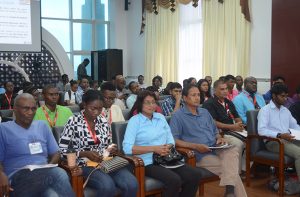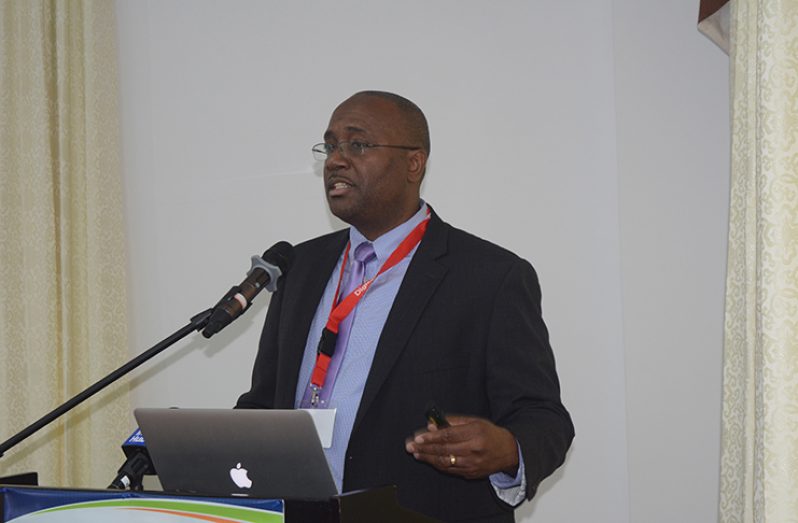– Regional expert tells private sector
THE role of the private sector in protecting their customers against cybercrime vulnerabilities was the centre of discussion at the Cyber Security Workshop on Thursday.
At the workshop hosted at the Arthur Chung Conference Centre (ACCC) as a part of the Caribbean Telecommunications Union (CTU) Information Communications Technology (ICT) Roadshow, it was noted that cybercrimes pose several social and economic challenges in the Caribbean.
Speaking to Guyana Chronicle, CTU Caribbean Regional Communications Infrastructure Programme (CARCIP) Coordinator Junior McIntyre, spoke of the work of several parties in the reduction of cybercrime activities in the region.
McIntyre said the private sector, which is often one of the main victims of cybercrimes, has a major role to play as a part of its Cooperate Social Responsibility (CSR) to monitor the daily uses of its products and services.
“If customers use a particular product or service from a particular company or firm and there is a report that comes into the firm that there is a breach or that someone used their product to commit a cybercrime then, therefore, it is the company’s responsibility to now share that information to the public. Because they may have to recall a device or update a device or produce patches and fixes to deal with the issue. Or even simply telling people that ‘this is the way you use our product’ or that ‘it is not meant to be used this way’ and putting mechanisms in place,” McIntyre said.

The CARCIP coordinator added that this requirement applies to social media platforms such as Facebook where many companies are now promoting their businesses.
“[They must] ensure that information, whether social media or information that is published, if it’s defamatory or if it is discriminating against anybody, that that information is removed. Those companies have a Cooperate Social Responsibility… you have to ensure that you moderate your content to ensure that your customers are not disenfranchised or affected negatively,” he cautioned.
INFORMATION SHARING
However, the private sector is not the only party which McIntyre pulled into the spotlight as he said students and parents can become part of the “change culture” by sharing the information they have on cybercrime.
He stated that they can also encourage persons to be responsible users of social media and mobile devices, noting that cybercrimes such online pornography and cyber bulling are very common issues in the region.
“There are pedophiles, people who would lure children into all kinds of situations and because the Internet is pervasive and people access the Internet from any part of the world, children can be exposed to threats coming from any part of the world. So it’s important that parents play a critical role,” he advised.
On the topic of cyberbullying, McIntyre said CARCIP’s strategy is one of promoting education in schools through government-managed networks and awareness campaigns.
He said too that the Caribbean ICT Road show, which also targets youths, gives additional support and sensitisation help to fight against this common form of harassment.
Should efforts towards the reduction of cybercrime be ignored, McIntyre said it will not only affect investment to a particular country or business, but it can negatively impact e-government, e-agriculture, and innovation as well as create ill perceptions about technology.
PROPER SYSTEM
As such, he advised: “It is important for governments… work with regional agencies to put structures in place, governance and systems in place and oversight to ensure that our environment is safe.”
Although he did not place an overall rating on the Caribbean’s preparedness for a major cyber-attack, McIntyre said the region has made strides towards becoming fully prepared and will continue to do so.
“We have a lot of work to do. We have a lot of catching up to do but the positive is that we have started and there is [support] from the top [ministerial level] and that is important. What we need to continue to do is to build capacity and we need to continue to keep the momentum going. We can’t find ourselves falling back anymore we,” he said.
He then urged that CARICOM states continue to follow through with all the elements of the CARICOM Cyber Security and Cybercrime Action Plan (CCSCAP) which he said requires vigilance and multi-stakeholder involvement.
CCSCAP is aimed at addressing the cyber security vulnerabilities in each participating Caribbean country and to establish a practical standard of practices, systems and expertise for cyber security.
It was developed following significant growth in cybercrime in the Caribbean such as the hacking of Government websites, child online exploitation and the use of crypto currencies to fund criminal activities.




.png)









